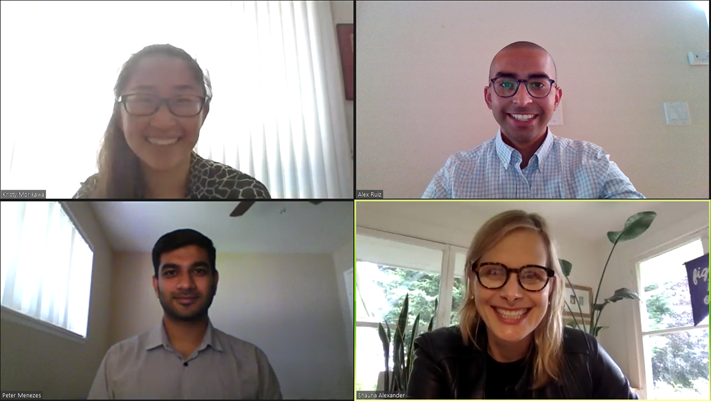


Keep this story going! Share below!
With direct trade, Stumptown Coffee has set the standard for developing sustainable business partnerships in today’s global economy. Their business practices have fostered economic stability for communities around the world, which benefit their business as well as their producers’, and ensures the highest quality coffee for their customers.
In 2003, Stumptown Coffee Roasters developed a new approach to supply chain management - a model they called “direct trade.” Under this business model, Stumptown makes a concerted effort to engage directly with coffee producers, small-scale and large cooperatives, from around the world. Ms. Shauna Alexander, Vice President of Sustainability and Coffee, describes it as, “direct trade is not about buying from anonymous traders or getting samples from an importer. Direct trade is about knowing the farmers and the farms that produce the coffee.”
This approach is not easy; building direct partnerships has required commitment and diligent work. An important aspect of direct trade is the pricing that gives economic stability to the producers and their communities. Stumptown has committed to pay prices based on the quality of the producers’ coffee, regardless of the state of the coffee commodity market. Another key aspect is the duration of the relationship, which allows the opportunity for the producers to hone their skills and develop their enterprise. All of this has resulted in a mutually beneficial relationship that benefits the producers, Stumptown, and customers alike.

Stumptown’s “Green Team” embodies the company’s motivation to make direct trade a success. The Green Team does much of the work to build the producer partnerships - which includes traveling to the often-remote locations that offer the perfect conditions for producing excellent coffee beans. Despite there being easier and less costly options, the Green Team members visit the producers often - all to achieve the goal of incentivizing quality production and improving the livelihood of their business partners.
Ms. Alexander explains that direct trade: “was really around sourcing coffee in a way that went directly to producers, negotiated directly with producers or producer organizations, based first and foremost on quality and price but also selecting producers that had really great operations.”
Since the goal of direct trade always went beyond better business, Stumptown Coffee has remained keenly aware of what impact their practices have. In 2018, Stumptown and sourcing partner Caravela invested in a third-party impact study on direct trade. Released in February 2020, the study reported that the direct trade practices had led to marked improvements in the economic livelihood of the producers, including many ancillary social benefits (resilience, family education, social justice, etc.).
A key strength of direct trade is that it is a business approach that Stumptown can continue to utilize despite future business changes. Ms. Alexander explains that at its origin Stumptown, “was pretty small, and it’s grown a lot, but [direct trade] has become the template for how Stumptown sources through a lot of changes over the past 17 years.” Therefore, these benefits will likely continue for Stumptown’s trade partners for generations to come.
The direct trade approach offers important business advantages. Stumptown builds close relationships with their producers, commits to long-term partnerships, and pays a quality-oriented price that remains stable regardless of economic shifts. By doing so, Stumptown cultivates a business relationship that enables its partners to continue producing quality coffee and encourages them to be innovative.
Stumptown’s business relationships with their producers span years. According to Ms. Alexander, “A lot of the direct trade partnerships we have had have been in place for 15 or more years.” In 2018, 27% of the coffees bought were from relationships that had been established for 10+ consecutive years. 51% were attributed to relationships of 5+ consecutive years. 89% were from relationships of at least 3 consecutive years, the minimum condition to be labeled as “direct trade”. The benefit for Stumptown is clear: a reliable supply chain and world-class coffee beans for their business.
When speaking of benefits for the producers, Ms. Alexander explains that direct trade has, “allowed them to invest in their coffees, to invest in their farms, and to invest in their communities.” When Ms. Alexander assumed the VP position, one of her key goals was to add credence to the societal benefits that she and her team members observed from the producers. In the report released in 2020, a third-party group was able to quantify statistically significant benefits that Stumptown’s producers had in comparison to a control group. 85% of the survey takers from the El Jordan producer in Tolima, Columbia had favorable views of their commercial relationship with Stumptown, compared to 44% of the control group. One survey taker said: “In 2012, I produced very little. Thanks to the negotiation with Caravela and Stumptown, I have been able to increase the size of my coffee production, knowing that I would have a better income and my children’s education has also benefited because of this.”
The Green Team is at the heart of Stumptown’s societal and environmental practices. Multiple times a year, they visit every producer to ensure the taste of the coffee and nurture their long-term partnerships. In addition, they assist with implementing a new farming practice, that ultimately lends itself to even better coffee; or teach a seminar, that introduces new ways to process coffee cherry (fruit of the coffee tree that surrounds the seed or bean). Ultimately, the Green Team works to help farms with their sustainability, as well as foster development within communities while delivering the highest-quality product.
Get stories of positive business innovations from around the world delivered right to your inbox.
Shauna Alexander, VP of Sustainability and Coffee


Stumptown Coffee Roasters is a coffee roaster and retailer based in Portland, Oregon, United States. They own cafés, roasteries, and a tasting annex.